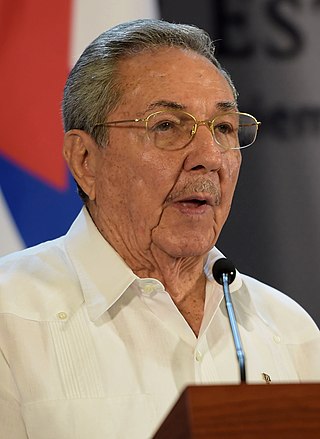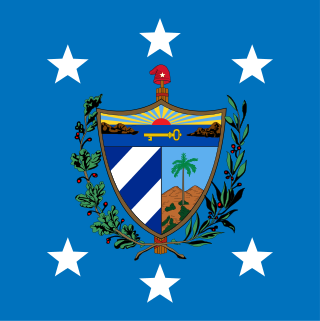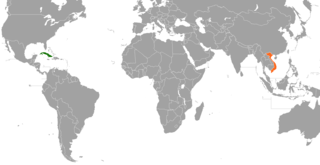| |||||
| Decades: | |||||
|---|---|---|---|---|---|
| See also: | |||||
Events in the year 2018 in Cuba .
| |||||
| Decades: | |||||
|---|---|---|---|---|---|
| See also: | |||||
Events in the year 2018 in Cuba .


Cuba has had a socialist political system since 1961 based on the "one state – one party" principle. Cuba is constitutionally defined as a single party Marxist–Leninist socialist republic with semi-presidential powers. The present Constitution of Cuba, which was passed in a 2019 referendum, also describes the role of the Communist Party of Cuba to be the "leading force of society and of the state" and as having the capability of setting national policy, and First Secretary of the Communist Party is the most powerful position in Cuba. The 2019 Constitution of Cuba identifies the ideals represented by Cuban independence hero José Martí and revolutionary leader Fidel Castro as the primary foundation of Cuba's political system, while also stressing the importance of the influence of the ideas of Marx, Engels, and Lenin.

Raúl Modesto Castro Ruz is a Cuban retired politician and general who served as the first secretary of the Communist Party of Cuba, the most senior position in the one-party communist state, from 2011 to 2021, and President of Cuba between 2008 and 2018, succeeding his brother Fidel Castro.

The president of Cuba, officially the president of the Republic of Cuba, is the head of state of Cuba. The office in its current form was established under the Constitution of 2019. The President is the second-highest office in Cuba and the highest state office. Miguel Díaz-Canel became President of the Council of State on 19 April 2018, taking over from Raúl Castro, and has been President of Cuba since 10 October 2019.
The Cuban Revolution was the overthrow of Fulgencio Batista's regime by the 26th of July Movement and the establishment of a new Cuban government led by Fidel Castro in 1959.

José Ramón Machado Ventura is a Cuban revolutionary and politician who was the First Vice President of the Council of State of Cuba from 2008 to 2013. With the election of Raúl Castro as President of Cuba on 24 February 2008, Machado was elected to succeed him as First Vice President, serving until 2013. He was elected Second Secretary of the Communist Party of Cuba in 2011.
In March 2009, President Raúl Castro of Cuba dismissed numerous government ministers.

The Order of José Martí is a state honor in Cuba. The Order was named so after José Martí, the national hero of Cuba. The design was realized by the Cuban sculptor José Delarra.

Cuban–Vietnam relations are the interstate and special relations between the Republic of Cuba and the Socialist Republic of Vietnam. The relations are based on trade, credits, and investments which have increased significantly since the 1990s and on shared ideological beliefs – they are both socialist states. Diplomatic relations between the post-revolutionary Cuba and the Democratic Republic of Vietnam were established on December 12, 1960. Since then, Vietnam has become Cuba's second-largest trading partner in Asia, with Vietnam trailing behind China.

Miguel Díaz-Canel Bermúdez is a Cuban politician and engineer. He has served as the 8th First Secretary of the Communist Party of Cuba since 2021 and as the 17th President of Cuba since 2019. In his capacity as First Secretary he is the most powerful person in the Cuban government.

The First Secretary of the Central Committee of the Communist Party of Cuba is the top leader of Cuba. The First Secretary is the highest office within the Communist Party of Cuba as well as ranking first in the Politburo, the highest decision-making body in Cuba, which makes the office holder the most powerful person in the Cuban government. In communist states the First or General Secretary of the Communist Party is typically the de facto leader of the country and a more powerful position than state offices such as President or Prime Minister, when those positions are held by different individuals.

The Communist Party of Cuba is the sole ruling party of Cuba. It was founded on 3 October 1965 as the successor to the United Party of the Cuban Socialist Revolution, which was in turn made up of the 26th of July Movement and Popular Socialist Party that seized power in Cuba after the 1959 Cuban Revolution. The party governs Cuba as an authoritarian one-party state where dissidence and political opposition are prohibited and repressed. The Cuban constitution ascribes the role of the party to be the "leading force of society and of the state".

The nations of Cuba and Mexico have had uninterrupted diplomatic relations since their establishment in 1902. Both nations are members of the Association of Caribbean States, Community of Latin American and Caribbean States, Latin American Integration Association, Organization of Ibero-American States, and the United Nations.
The following lists events that happened during 2015 in Cuba.
The following lists events that happened during 2016 in Cuba.

Parliamentary elections were held in Cuba on 11 March 2018 to elect members of the National Assembly of People's Power. Prior to the elections, President Raúl Castro declared he would not be seeking a new term, and a new President of the Council of State will be elected by the National Assembly. His deputy, Miguel Díaz-Canel, was subsequently elected as the new president. However, Castro remained the First Secretary of the Communist Party of Cuba, the most senior position in the country.
Events in the year 2017 in Cuba.
Events in the year 2019 in Cuba.

First Lady of Cuba is de facto title of the wife of the President of the Republic of Cuba. The current first lady of Cuba is Lis Cuesta Peraza, the second wife of President Miguel Díaz-Canel, who is also the First Secretary of the Communist Party of Cuba, the most senior position in the Cuban government. She is the first presidential wife to be referred to as "first lady" by Cuban state media since the 1960s.
This article covers events in the year 2021 in Cuba.
"I confirm to this assembly that Raul Castro, as first secretary of the Communist Party, will lead the decisions about the future of the country," Diaz-Canel said.